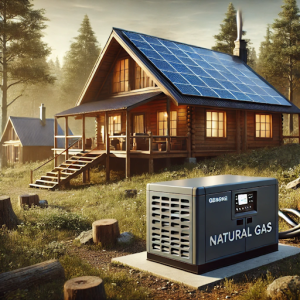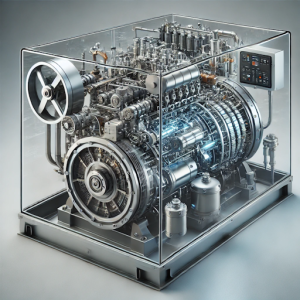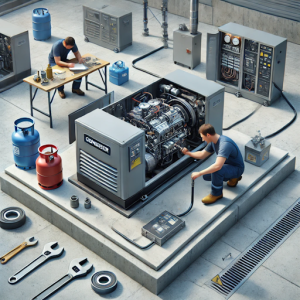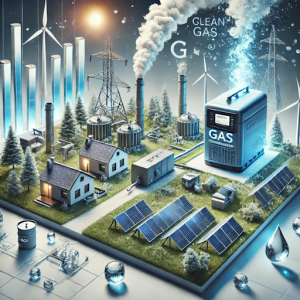Discover the Transformative Advantages of Natural Gas Generators for Sustainable Off-Grid Living
Natural gas generators emerge as a top-tier solution for individuals seeking a dependable power source for homes or cabins in remote locations. Understanding the various methods of energy generation is essential for embarking on a successful journey toward off-grid living. The unique benefits of natural gas generators, which include their remarkable reliability, cost-effectiveness, and eco-friendly characteristics, make them an appealing choice for off-grid enthusiasts who emphasize sustainability and efficiency in their lifestyles.
In our increasingly technology-driven environment, the allure of off-grid living has captivated many. Whether driven by a desire for sustainability, freedom, or the aspiration for a self-sufficient lifestyle, disconnecting from conventional power grids can lead to immense satisfaction. Off-grid energy solutions grant you the ability to harness energy from renewable sources or alternative fuels, facilitating a comfortable living experience while remaining independent of traditional electricity supplies.
By arming yourself with essential knowledge and thorough preparation, you can effortlessly integrate a natural gas generator into your off-grid lifestyle, ensuring that your crucial energy needs are met continuously with a dependable power source. This article will delve into the myriad benefits of natural gas generators, clarify their operational workings, and highlight vital considerations for selecting and installing these systems in your off-grid setup.
 Crucial Insights to Elevate Your Off-Grid Power Solutions
Crucial Insights to Elevate Your Off-Grid Power Solutions
- Off-grid power solutions allow you to liberate yourself from traditional energy sources, making them indispensable for remote living or during unforeseen power outages.
- Natural gas generators deliver reliable and efficient energy production, boasting significantly lower emissions compared to diesel or gasoline counterparts.
- These generators function by combusting natural gas to create mechanical energy, which is subsequently converted into electrical energy through a generator system.
- When selecting a natural gas generator, it is essential to assess factors like power output, fuel efficiency, and maintenance requirements to guarantee optimal performance.
- Proper installation and routine maintenance are crucial for the safe and efficient operation of your natural gas generator.
Uncover the Outstanding Benefits of Natural Gas Generators for Reliable Power Generation
A standout feature of natural gas generators is their unparalleled reliability. By opting for a natural gas generator to meet your off-grid energy demands, you can rely on a consistent power supply tailored specifically to your needs. Unlike solar panels or wind turbines, which can be significantly affected by weather changes, natural gas generators provide stable energy output, regardless of external conditions.
This reliability is particularly vital for those who depend on electricity for essential operations such as heating, refrigeration, or running medical devices. The assurance that your generator will supply power when you need it most brings a sense of security. Beyond their reliability, natural gas generators also offer considerable cost savings.
Even though the initial investment might be higher than some alternative off-grid options, the long-term savings can be quite substantial. Generally, natural gas is more affordable than gasoline or diesel, leading to lower operating costs over time. Additionally, the maintenance requirements for natural gas generators tend to be less demanding than those for other types, allowing you to save both time and financial resources while benefiting from a reliable energy source.
 Understanding the Operational Mechanics of Natural Gas Generators
Understanding the Operational Mechanics of Natural Gas Generators
Natural gas generators function by transforming the chemical energy found in natural gas into electrical energy through a combustion process. When the generator is activated, natural gas is combined with air and ignited within the engine’s combustion chamber. This ignition generates high-pressure gases that push the engine’s pistons, ultimately turning the generator’s rotor and producing electricity.
This operational approach is notable for its efficiency, as it is cleaner compared to other available fossil fuel options. A critical component of a natural gas generator is its fuel system, which often includes a regulator to control gas flow, ensuring peak performance. Modern natural gas generators come equipped with advanced features like automatic start/stop capabilities and remote monitoring functionalities.
These innovations significantly enhance user convenience, enabling you to manage your power supply more effectively and streamline your off-grid lifestyle.
Key Considerations for Selecting the Ideal Natural Gas Generator
| Consideration | Description |
|---|---|
| Power Output | Assess the generator’s required power output based on the appliances and equipment you plan to use. |
| Fuel Type | Choose natural gas as your fuel option for its clean-burning and economical qualities. |
| Size and Portability | Select a generator size and portability that match your available space and mobility requirements. |
| Noise Level | Evaluate the generator’s noise output to ensure it meets acceptable standards for your living environment. |
| Start-up Mechanism | Choose between manual or automatic start-up options based on your convenience and how often you will use it. |
When selecting a natural gas generator for your off-grid configuration, several critical factors must be taken into account. First and foremost, evaluate your power requirements. Calculate the total wattage necessary to sustain your essential appliances and devices, ensuring your selected generator can handle the load efficiently.
It is advisable to opt for a generator with a slightly higher capacity than your calculated requirements to account for any sudden surges in power demand. Additionally, consider the generator’s portability and installation needs. If you plan to move your generator frequently or use it in various locations, seek a lightweight and easily transportable model.
Moreover, contemplate whether you prefer a stationary setup or a portable unit that can be conveniently installed according to your requirements. Lastly, pay attention to the generator’s noise levels; quieter models can significantly enhance your off-grid experience by minimizing disturbances and preserving the serenity of your natural surroundings.
 Best Practices for Effective Installation and Maintenance of Natural Gas Generators
Best Practices for Effective Installation and Maintenance of Natural Gas Generators
The installation of a natural gas generator requires meticulous planning and execution to ensure both safety and efficiency. Begin by selecting a suitable location for your generator, ensuring compliance with local regulations and safety guidelines. This site should ideally be well-ventilated and distanced from any flammable materials.
You may also need to establish a concrete pad or platform to stabilize and protect the generator from moisture damage. Once the optimal location is identified, connect the generator to your natural gas supply line. If you lack experience with gas line installations, seeking professional assistance is advisable to ensure adherence to safety standards.
After establishing the necessary fuel connection, set up the electrical connections to integrate the generator with your home’s power system. Routine maintenance is vital for ensuring your generator operates smoothly over time. This includes regularly checking oil levels, replacing air filters, and inspecting spark plugs to maintain peak performance.
Comparative Cost Analysis: Natural Gas Generators vs. Other Off-Grid Power Solutions
When assessing the costs associated with off-grid energy solutions, conducting a comprehensive comparison between natural gas generators and alternative options such as solar panels and diesel generators is essential. While solar energy systems are often touted for their renewable nature, they frequently require significant initial investments in panels, batteries, and inverters. Furthermore, solar systems may struggle to provide adequate power during cloudy conditions or at night without sufficient battery storage.
On the other hand, diesel generators are recognized for their reliability, but they entail higher fuel costs and more frequent maintenance compared to natural gas generators. Given that diesel fuel prices can vary greatly, natural gas often presents a more stable and frequently lower-cost option across various regions. A long-term cost analysis typically indicates that natural gas generators are more economical for those pursuing off-grid living.
 Assessing the Environmental Impact of Natural Gas Generators in Off-Grid Living
Assessing the Environmental Impact of Natural Gas Generators in Off-Grid Living
As you explore various off-grid energy options, it is crucial to evaluate their environmental impact. Natural gas is often marketed as a cleaner alternative to other fossil fuels, such as coal or oil, due to its lower carbon emissions during combustion. By choosing a natural gas generator, you can significantly reduce your carbon footprint while enjoying reliable electricity for your off-grid lifestyle.
However, it is important to recognize that natural gas remains a fossil fuel, and its extraction can lead to environmental consequences. Methane leaks during extraction and transportation present substantial challenges concerning greenhouse gas emissions. To address these issues, prioritize sourcing natural gas from trusted suppliers who are committed to sustainable practices.
Additionally, incorporating renewable energy sources alongside your natural gas generator can further showcase your dedication to environmental sustainability and responsible energy usage.
Inspiring Real-Life Success Stories of Off-Grid Power Solutions Using Natural Gas Generators
Examining real-world examples can provide valuable insights into how natural gas generators have been effectively utilized in off-grid living scenarios. For instance, numerous rural homeowners have made the successful transition to natural gas generators as their primary energy source after facing persistent outages from conventional utility services. The integration of these generators has enabled them to achieve energy independence while ensuring a steady supply of electricity for heating, cooling, and essential appliances.
Another compelling case involves remote cabins that depend on natural gas generators for seasonal use. Due to their isolated locations, these cabins often lack access to traditional power sources. Natural gas generators allow cabin owners to enjoy modern amenities like refrigeration and lighting without sacrificing their connection to the natural environment.
These success stories demonstrate how natural gas generators can effectively support off-grid living, providing both comfort and reliability. As you embark on your path toward off-grid living, consider the extensive advantages that natural gas generators can provide. From their dependable energy supply and cost-effectiveness to their relatively minimal environmental impact, these generators can play a crucial role in achieving energy independence.
By thoughtfully selecting the appropriate model for your needs and adhering to proper installation and maintenance procedures, you can smoothly transition into an off-grid lifestyle powered by natural gas.
Answering Common Questions About Natural Gas Generators for Off-Grid Living
What characterizes a natural gas generator for off-grid applications?
A natural gas generator for off-grid living is a power generation system that utilizes natural gas as its fuel source to produce electricity in remote areas where access to the main power grid is limited or non-existent.
How does a natural gas generator work for off-grid use?
A natural gas generator designed for off-grid applications operates by combusting natural gas within an internal combustion engine. This process generates mechanical energy, which is then converted into electrical energy via a generator. The electricity produced can power various appliances, equipment, and lighting in off-grid environments.
What are the main advantages of using a natural gas generator for off-grid living?
Key benefits of utilizing a natural gas generator for off-grid living include:
– Reduced fuel costs compared to diesel or gasoline generators
– Cleaner combustion resulting in lower emissions
– Continuous fuel supply sourced from natural gas pipelines
– Lower maintenance requirements compared to other fuel types
What factors should you consider when using a natural gas generator for off-grid living?
Important considerations for using a natural gas generator in off-grid scenarios include:
– Availability of natural gas supply in your area
– Initial installation and equipment costs
– Ongoing maintenance and servicing needs
– Environmental implications and adherence to emissions regulations
Is it feasible to use a natural gas generator for off-grid residential and commercial purposes?
Natural gas generators designed for off-grid use are suitable for both residential and commercial applications. They are frequently employed in remote homes, cabins, farms, and small businesses that lack connectivity to the main power grid.
The post Natural Gas Generators for Off-Grid Power Solutions appeared first on Survival Bite.
The Article Natural Gas Generators: Your Off-Grid Power Solution Was Found On https://limitsofstrategy.com


The exploration of off-grid living truly resonates with me, especially as I’ve been contemplating the balance between modern convenience and sustainable practices. I appreciate your emphasis on natural gas generators; their reliability is indeed a game changer for those venturing away from conventional grids.
It’s interesting to hear your thoughts on off-grid living and the dance between modern conveniences and sustainable practices. Many people find themselves at this crossroads, trying to carve out a lifestyle that serves both their comfort and their values. The idea of backing away from the conventional grid is appealing, especially when we consider the environmental impacts of our daily choices and the escalating challenges of climate change.
It’s interesting how exploring off-grid living really opens up a dialogue about what we value in our daily lives. The balance between modern convenience and sustainable practices can be quite the tightrope walk. I’ve been thinking a lot about that tension myself.
It’s fascinating how exploring off-grid living really does spark deeper conversations about our values. When you start examining what it means to live outside the conventional flow, you quickly realize how much our everyday choices reflect our priorities. For many, the allure of modern conveniences is undeniable. Hot showers, endless power at the flip of a switch, and grocery stores filled with every kind of food available year-round—these elements shape a lifestyle that many of us have come to know and appreciate.
Your exploration of natural gas generators as a reliable option for off-grid living really resonates with me, particularly given the increasing importance of sustainability in our energy choices. I have been researching various energy generation methods for my own off-grid aspirations, and it’s fascinating how natural gas can often strike a balance between availability, efficiency, and ecological considerations.
It’s great to hear that the exploration of natural gas generators resonates with you. The move towards off-grid living definitely brings a lot of options to the table, and it’s intriguing how natural gas seems to balance reliability with sustainability considerations.
It’s great to hear that my exploration of natural gas generators resonated with you. The balance between energy availability, efficiency, and ecological impact is a key consideration for many, especially as the demand for sustainable solutions grows.
The exploration of natural gas generators as a cornerstone for sustainable off-grid living is both timely and pertinent, especially as more individuals contemplate the implications of energy independence. The reliability and efficiency of these generators offer a compelling alternative to traditional fuel sources, particularly in remote areas where access to the electrical grid is limited.
I find your exploration of natural gas generators in the context of off-grid living to be both timely and thought-provoking! The conversation around sustainable energy solutions is critical, especially as many of us look for ways to reduce our carbon footprint and embrace more self-sufficient lifestyles.